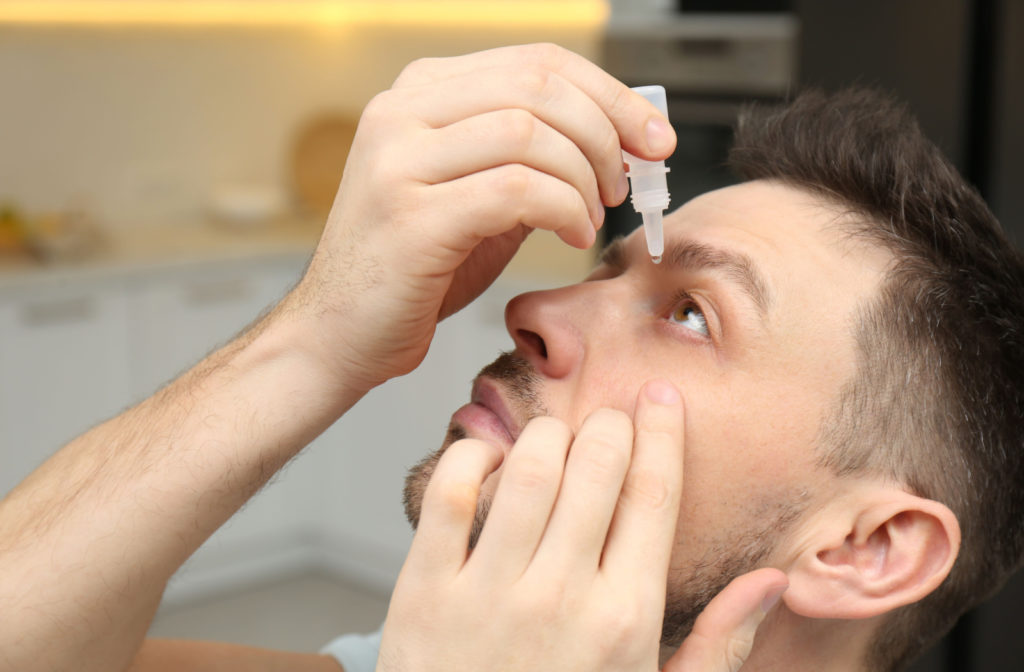Allergies aren’t something that most people enjoy. They can cause a runny nose, throat irritation, itchiness, and more. But did you know that if your eyes come into contact with an allergen, it can trigger more symptoms in your eyes?
If an allergen comes into contact with the surface of your eye, it can begin to cause redness, swelling, and irritation. This can lead to blurry vision if left unaddressed.
This makes it essential to regularly visit your optometrist if you notice you’re having problems with your vision. Your eye doctor can perform a comprehensive eye exam and help you build a treatment plan to minimize the effect of allergies on your eyes.
Why Do Allergies Affect the Eyes?
Allergies are best described as your body’s immune system overreacting to a triggering substance or allergen. This reaction can lead to a range of symptoms, like a runny nose or an itchy throat. However, they can have a particular impact on the eye. This is called “allergic conjunctivitis.”
The human eye is an extremely sensitive organ with a thin, delicate membrane covering the surface called the “conjunctiva.” If you’re allergic to something and that allergen comes into contact with the conjunctiva, it can cause this part of the eye to have a reaction—hence “allergic conjunctivitis.”
This is often due to the fact that the eye is one of the few organs that’s always exposed to your environment. So if you have an allergy to a certain thing like pollen, dander, or dust, the eye is often exposed to it if it’s airborne. And unfortunately, if this allergen becomes trapped in your tear film, the eye can be exposed to it for a longer period of time.
What Symptoms Can Allergies Cause?
If you come into contact with an allergen, it sets off the immune system to try and flush it out. When allergens come into contact with your eye, it can cause:
- Redness
- Discomfort
- Irritation
- Itching
- Burning
- Excessive tearing
- Swelling
- Light sensitivity
Allergies can also cause the feeling of something being trapped between your eyelid and eyeball, leading to something called “foreign body sensation.” If you wear contact lenses, many of these symptoms can be much worse. This may be caused by the allergen remaining on the surface of the contact, exposing your eye to the allergen for an extended period of time.
The Link Between Allergies & Blurry Vision
It can help to think of allergies as if they’re causing severe inflammation—because they often do.
When the conjunctiva comes into contact with an allergen, it triggers a response across the eye. This allergic response can lead to an increase in inflammation on the surface of the eye, which can cause it to swell and become irritated.
Swelling from the allergic response can result in changes to the natural shape of your eye. This leads to light refracting improperly towards your retina, leading to light rays scattering through your eye. The visual misinformation is then sent to the brain, which struggles to properly interpret what it’s being sent.
Along with the physical change to your eye’s shape, an allergic reaction can cause excessive tearing or discharge from the eyes—this is the body trying to remove the allergen. However, this response can disrupt the balance of your natural tear film, causing light to scatter as it enters the eye, leading to blurry or hazy vision.

How to Treat Vision Problems Caused by Allergies
If you know that you’re allergic—or even just sensitive—to a certain allergen, the first step you should take is to minimize your contact with it. However, this isn’t always possible. Allergies can be frustrating, but fortunately, there are several things you can do to reduce their effects on your life.
- Take allergy medications, like antihistamines, to provide your eyes with quick relief.
- Use eye drops if needed to clear your vision.
- Apply a cold compress to your eyes to reduce inflammation.
- Wear proper vision protection, like goggles or sunglasses, if needed.
- Take prescription medication if recommended by an optometrist or healthcare professional.
If you wear contact lenses, you should actively practice proper care for them. Make sure that both your case and cleaning solution are up-to-date, as these can cause potential side effects if expired. Follow proper hygiene practices when handling your contact lenses, like washing your hands when handling them. It can help to switch to daily disposable lenses during allergy season to avoid the buildup of contaminants and allergens on the lenses.
However, if you notice that your eyes are often irritated, red, or sore, you should visit an optometrist for a comprehensive eye exam so they can thoroughly check out your eyes.
Where to Get Help for Your Vision
At Total Vision Solana Beach, we know it isn’t always possible to avoid allergic reactions. Fortunately, our team of experienced optometrists and support staff are here to help you with your optical needs. Contact us today, or book an appointment to start on the road to finding relief from your allergies.



